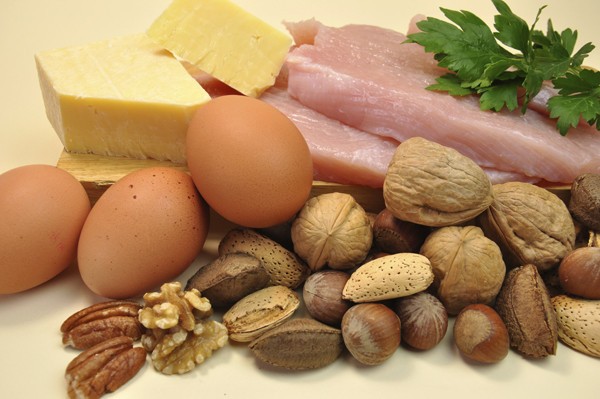Protein is a vital macronutrient, playing a critical role in various bodily functions. From building and repairing tissues to producing enzymes and hormones, protein is indispensable for maintaining optimal health. But How Much Protein In A Day Do You Need? This guide provides a comprehensive overview of protein requirements, factors influencing those needs, and how to choose the best protein sources.
Understanding Your Daily Protein Needs
The Recommended Dietary Allowance (RDA) for protein is 0.8 grams per kilogram of body weight, or 0.36 grams per pound. This is the minimum amount needed to prevent deficiency in healthy adults. However, individual protein needs can vary significantly depending on several factors.
 photo of an assortment of high-protein foods including cheese, eggs, fish, nuts
photo of an assortment of high-protein foods including cheese, eggs, fish, nuts
Assortment of high-protein foods including cheese, eggs, fish, and nuts, providing essential amino acids for muscle repair and overall health.
Factors Influencing Protein Requirements
Several factors influence how much protein you need daily:
1. Activity Level
Active individuals, especially those engaging in strength training or high-intensity exercises, require more protein to repair and rebuild muscle tissue. Athletes may need between 1.2 to 2.0 grams of protein per kilogram of body weight.
2. Age
As we age, we tend to lose muscle mass (sarcopenia). Therefore, older adults may benefit from a higher protein intake to help preserve muscle mass and strength. Some research suggests that older adults may require 1.0 to 1.2 grams of protein per kilogram of body weight.
3. Pregnancy and Breastfeeding
Pregnant and breastfeeding women have increased protein needs to support the growth and development of the fetus and infant. The American Pregnancy Association recommends 75 to 100 grams of protein per day during pregnancy, but you should always consult with your healthcare provider for personalized recommendations.
4. Health Conditions
Certain medical conditions, such as kidney disease, may require adjustments to protein intake. It’s essential to work with a healthcare professional or registered dietitian to determine the appropriate protein intake for your specific health needs.
5. Weight Goals
If you’re trying to lose weight, a higher protein intake can help you feel fuller for longer, preserve muscle mass during calorie restriction, and boost metabolism. Conversely, if you’re trying to gain weight, adequate protein is crucial for building new muscle tissue.
Calculating Your Personal Protein Needs
To estimate your daily protein needs, consider the factors mentioned above and use the following guidelines:
- Sedentary adults: 0.8 grams of protein per kilogram of body weight (0.36 grams per pound)
- Active adults: 1.2 to 2.0 grams of protein per kilogram of body weight (0.54 to 0.9 grams per pound)
- Older adults: 1.0 to 1.2 grams of protein per kilogram of body weight (0.45 to 0.54 grams per pound)
- Pregnant and breastfeeding women: 75 to 100 grams of protein per day (consult with your doctor)
You can use online protein calculators or consult with a registered dietitian for a more precise assessment of your protein needs.
Best Sources of Protein
While the quantity of protein is important, the source of protein also matters. Aim for a variety of protein sources, including:
- Lean Meats: Chicken, turkey, and lean cuts of beef and pork are excellent sources of protein.
- Fish: Salmon, tuna, and other types of fish are rich in protein and omega-3 fatty acids.
- Eggs: Eggs are a complete protein source and provide essential nutrients.
- Dairy: Milk, yogurt (especially Greek yogurt), and cheese are good sources of protein and calcium.
- Legumes: Beans, lentils, and peas are plant-based sources of protein and fiber.
- Nuts and Seeds: Almonds, walnuts, chia seeds, and flaxseeds provide protein and healthy fats.
- Whole Grains: Quinoa, brown rice, and other whole grains contain some protein.
When choosing protein sources, consider the “protein package” – the fats, carbohydrates, vitamins, and minerals that come along with the protein. Opt for sources low in saturated fat and processed carbohydrates and rich in essential nutrients.
Tips for Optimizing Protein Intake
- Spread your protein intake throughout the day: Instead of consuming most of your protein at one meal, distribute it evenly across breakfast, lunch, and dinner.
- Include protein in every meal: Aim for at least 20-30 grams of protein per meal.
- Choose whole, unprocessed protein sources: Prioritize lean meats, fish, eggs, legumes, and nuts over processed meats and protein bars.
- Read food labels carefully: Pay attention to the protein content and other nutritional information on packaged foods.
The Bottom Line
Determining how much protein in a day do you need depends on various individual factors. While the RDA provides a baseline, athletes, older adults, pregnant women, and individuals with certain health conditions may require more. By understanding your specific needs and choosing a variety of healthy protein sources, you can optimize your protein intake for overall health and well-being. Always consult with a healthcare professional or registered dietitian for personalized recommendations.
